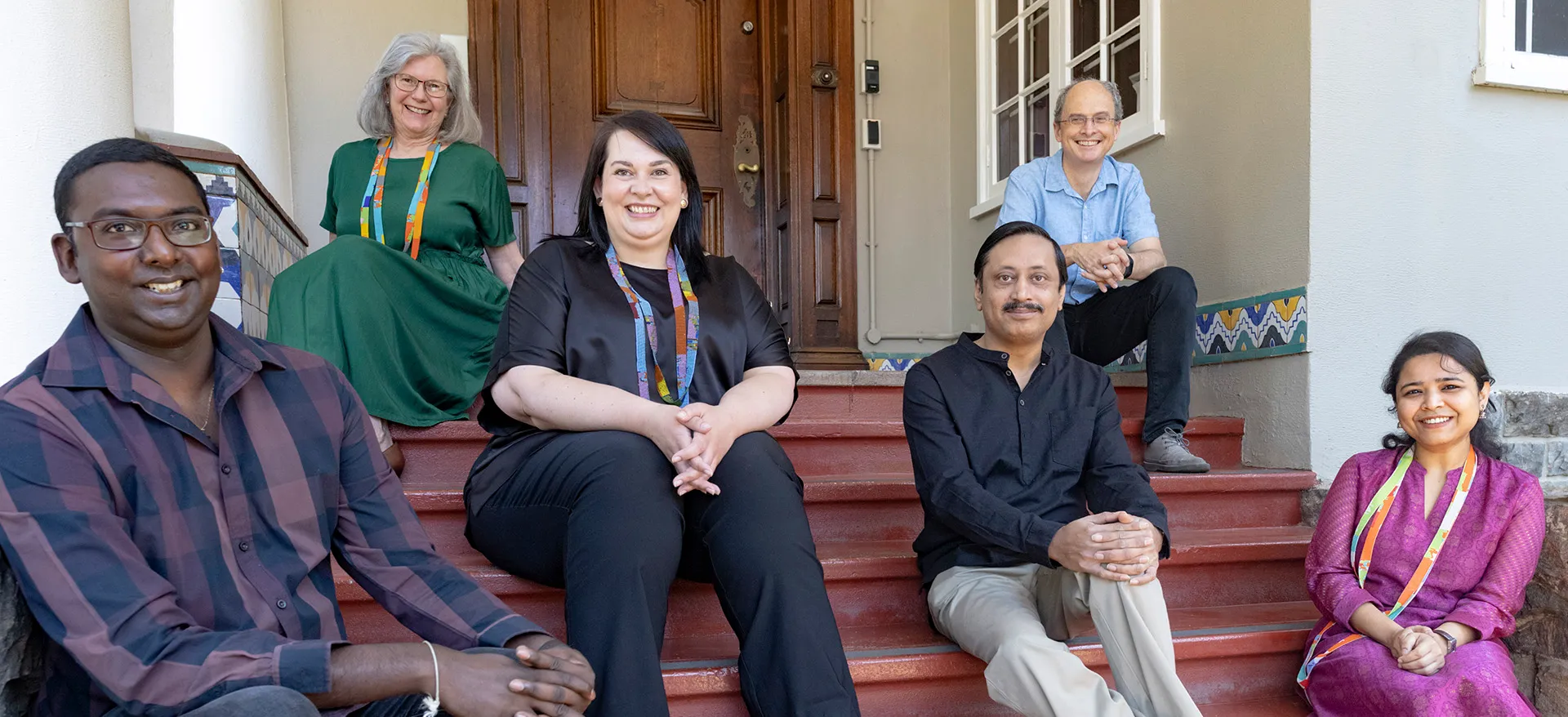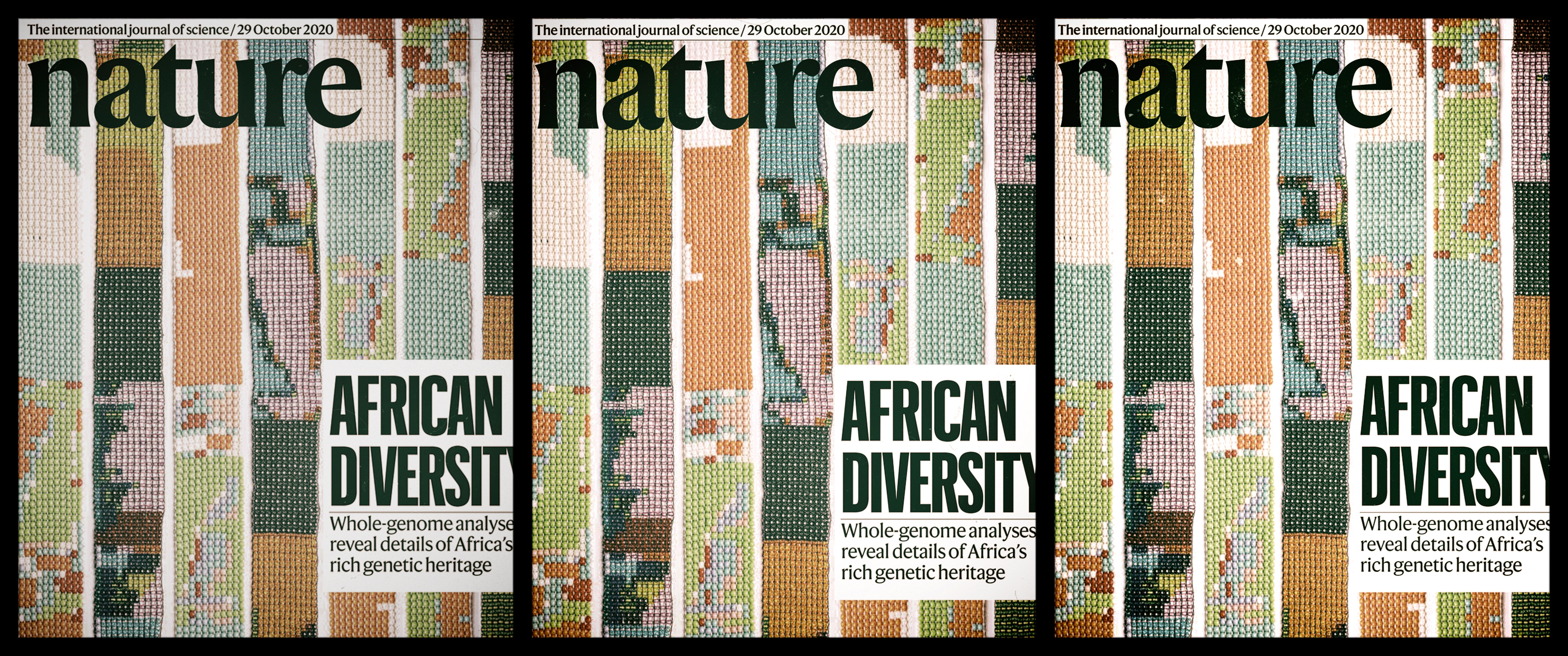In a new study published Wednesday afternoon in Nature the whole genomes of 426 people from 13 African countries were analysed. Their ancestries represent 50 ethnolinguistic groups from across the continent.
 Researchers from the Sydney Brenner Institute for Molecular Bioscience at the University of the Witwatersrand who was part of the international study on African Genomes. At the back are: Prof Michele Ramsay and Prof Scott Hazelhurst. In front: Mr Shaun Aron; Prof Zané Lombard, leader of the study and who is from the Division of Human Genetics at Wits; Dr Ananyo Choudhury and Dr Dhriti Sengupta.(Photo: Wits University)
Researchers from the Sydney Brenner Institute for Molecular Bioscience at the University of the Witwatersrand who was part of the international study on African Genomes. At the back are: Prof Michele Ramsay and Prof Scott Hazelhurst. In front: Mr Shaun Aron; Prof Zané Lombard, leader of the study and who is from the Division of Human Genetics at Wits; Dr Ananyo Choudhury and Dr Dhriti Sengupta.(Photo: Wits University)
Prof Michèle Ramsay, director of the Sydney Brenner Institute for Molecular Bioscience in the Faculty of Health Sciences at Wits University, explained the importance of discovering three million novel genetic variants to Maverick Citizen: “What is remarkable is that every time we study African genomes we discover many novel variants, even though the databases are keeping track of all known variants from research done worldwide. European populations are well studied, but in fact have much less genetic variation and have been studied more frequently, and therefore discoverability of novel findings is much lower. There is so much more to explore in the genetic makeup of Africans.”
African populations have a much greater genetic variation because they are far older and because, when the “out of Africa” migrations took place, only small groups of people left the continent.
It is important to study genetic variation for two main reasons, firstly it may be relevant to health and disease susceptibility, and secondly, it can reveal fascinating historic links between peoples and groups.
“We can observe deep ancestral relationships between populations we did not know about,” says Ramsay, “such as historical interactions and migration events across Africa.”
One of the interesting findings is the diversity across Africa, with some variants far more common in specific regions. For example, people who are carriers of sickle-cell anaemia are more likely to be found in areas where malaria is hyperendemic, because this variant protects them against severe malaria. This is an evolutionary adaptation to the environment.
 One of the interesting findings of a new genomic study is the diversity across Africa where some gene variants are far more common in specific regions.( Photo. Wits University)
One of the interesting findings of a new genomic study is the diversity across Africa where some gene variants are far more common in specific regions.( Photo. Wits University)
The work revealed evidence supporting movement from East Africa to central Nigeria between 1,500 and 2,000 years ago through the identification of a substantial amount of East African ancestry — particularly Nilo-Saharan from Chad — in a central Nigerian ethnolinguistic group, the Berom. It was not previously known that they ever had contact.
Ramsay said genetic information about populations could highlight information about past encounters. “It is a biological reflection of history. Much of human evolution has no written history, but genomes are a permanent record. It tells the story of us, of humans.”
The study was led by Prof Zané Lombard in the Division of Human Genetics at the University of the Witwatersrand (Wits) and under the auspices of Human Heredity and Health in Africa (H3Africa).
The researchers found more than 100 areas of the genome that had been under natural selection, and of these 62 genes had not been seen before.
Lombard explained that, during the course of evolution and its mechanism of natural selection, people tried to survive through hundreds of thousands of years. The environment, diet, infections and migration all had an influence on how and who survived. Each generation carried their genetic material to the next and within this myriad of sequences there are genes which gave people some advantages.
“These genes have selection signals which we can pick up when looking at the genomes of people living today. They indicate large-scale adaptations in specific areas and specific groups have different natural selection patterns; 62 of these selection signals are seen for the first time in this group of individuals from Africa. This gives us clues where to do further research; for example, in those genes associated with immunity.”
The team is just starting to unravel the secrets of these new variants. It has shown these signals were noticeably different when geographic areas were compared. When people migrated, large-scale adaptations took place and today that can be seen in genomes.
Despite Africa’s central role in the origin of modern humans, the knowledge of the genetic diversity in African populations has been sparse. Most genomic studies have been done in other populations, but this is slowly changing, years after the first complete human genome was sequenced and published in 2003.
The authors wrote in the paper: “The African continent is regarded as the cradle of modern humans and African genomes contain more genetic variation than those from any other continent, yet only a fraction of the genetic diversity among African individuals has been surveyed.
“Advances in genomics have empowered the interrogation of the human genome across global populations, with the resulting studies demonstrating that Africa harbours the most genetic variation and diversity. To date, only a limited number of the around 2,000 African ethnolinguistic groups have been genetically characterised.”
The H3Africa Consortium supports 48 genomic projects and seeks to redress the lack of information by studying the genomes of peoples across the breadth of Africa, to understand the population demography of human disease.
“This is very important for us, to show that we have the capacity in Africa to do this work,” noted Lombard. “It is a milestone that so many researchers from Africa, representing more than 24 African research institutions across the continent contributed, for the lead article in Nature.
“Adding genomic data from all global populations – including Africa – is essential to ensure that everyone can benefit from the advances in health that precision medicine offers.”
Precision medicine – or “personalised’ medicine” – refers to disease treatment and prevention that takes into account individual variability in genes, environment and lifestyle for each person,” she explained. DM/MC




 One of the interesting findings of a new genomic study is the diversity across Africa where some gene variants are far more common in specific regions.( Photo. Wits University)
One of the interesting findings of a new genomic study is the diversity across Africa where some gene variants are far more common in specific regions.( Photo. Wits University)